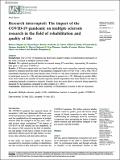Research interrupted: The impact of the COVID-19 pandemic on multiple sclerosis research in the field of rehabilitation and quality of life

Date
2021-08-26Author
Maguire, Rebecca
Hynes, Sinéad
Seebacher, Barbara
Block, Valerie J.
Zackowski, Kathy M.
Jonsdottir, Johanna
Finlayson, Marcia
Plummer, Prue
Freeman, Jennifer
Giesser, Barbara
von Geldern, Gloria
Ploughman, Michelle
Metadata
Show full item recordUsage
This item's downloads: 70 (view details)
Cited 0 times in Scopus (view citations)
Recommended Citation
Maguire, Rebecca, Hynes, Sinead, Seebacher, Barbara, Block, Valerie J, Zackowski, Kathy M, Jonsdottir, Johanna, Finlayson, Marcia, Plummer, Prue, Freeman, Jennifer, Giesser, Barbara, von Geldern, Gloria, Ploughman, Michelle. (2021). Research interrupted: The impact of the COVID-19 pandemic on multiple sclerosis research in the field of rehabilitation and quality of life. Multiple Sclerosis Journal - Experimental, Translational and Clinical, 7(3), doi: 10.1177/20552173211038030
Published Version
Abstract
Background
The COVID-19 pandemic has likely had a negative impact on rehabilitation and quality of life (QoL) research in multiple sclerosis (MS).
Method
We explored perceived barriers to research among 87 researchers, representing 18 countries, both prior to and since COVID-19.
Results
A Wilcoxon signed-rank test found that significantly more researchers reported experiencing barriers to research since the onset of the pandemic compared to pre-COVID-19 (p < .001), with 78% of respondents reporting at least some barriers since COVID-19. The most commonly-cited barriers related to participant access (n = 38) and interruptions/delays to projects (n = 19). Although no gender differences were found in the number of barriers reported, female respondents were more likely to cite time or competing demands as barriers to research. Females were also more likely to perceive being negatively impacted by the pandemic compared to other genders (p = .007).
Conclusions
Implications for the future landscape of rehabilitation research in MS are discussed.

